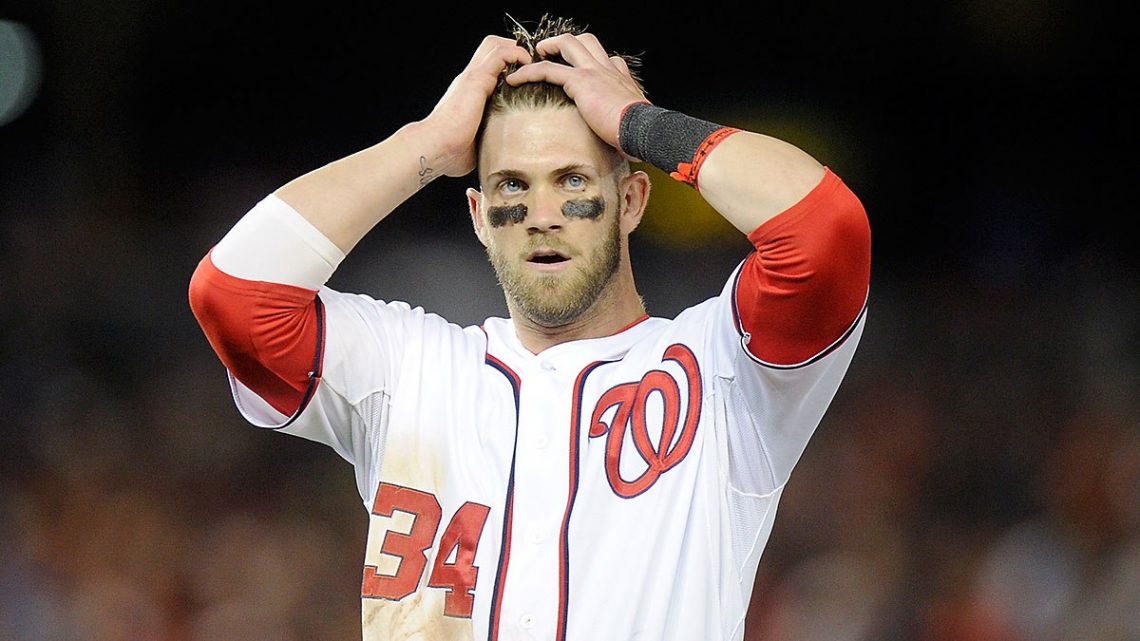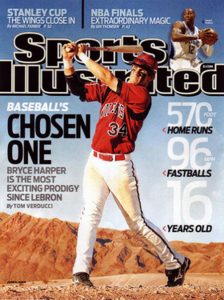
Bryce Harper is NOT a Superstar
I am not trying to be provocative; this is not a “hot take”; I am not in the business of taking unnecessary shots.
Bryce Harper is good, very good. Harper may, in fact, be great. But Bryce Harper is not a superstar. Now, past performance is no guarantee of future results. As such, Mr. Harper may become a superstar. He may start his ascent this season, keep getting better into his mid and late twenties, and retire as one of the best to ever play the game. Who knows? But with all of this talk of $300M, $400M, $500M contracts in the ether as Bryce heads into free agency, I think it is important to step back and look at the facts. And by facts, I mean numbers.
About eighteen months ago I wrote an article comparing Harper to Mike Trout (who IS a superstar; and who, barring injury, will be (if he isn’t already) one of the best to ever play the game). Nothing has fundamentally changed since that analysis was completed after the 2016 season.
What has changed is that Harper had another good, but not great, season; and Trout had another brilliant (if injury-shortened) one.
When people speak of Harper, they do so in hushed tones. They hearken back to the teenage phenom on the cover of Sports Illustrated and the reported 570-foot homerun in Las Vegas at age 15. And then, inevitably, the conversation turns to Harper’s 2015 season in which he led the league in homeruns, runs, slugging, OBP, OPS, and WAR. With those numbers, he was the league’s Most Valuable Player.
Every season Harper is a perennial MVP candidate. And every season – save for 2015 – something happens to dash those hopes. In 2013 it was a knee injury; in 2014 it was a thumb injury; in 2016 it was a slew of walks by the Cubs in May that through him off the scent; in 2017 it was another knee injury. And this season – which started with a lot of promise with eight homeruns and a 1.265 OPS in his first 17 games – it seems like impending free agency is causing him to press, expand the strike zone, thus leaving him hitting .232 (albeit with a tie for the league-lead in homeruns with 13 and a .931 OPS*).
But if we break down Harper’s first six years, we see the following:
| fWAR | OPS | RUNS | |
| 2012 | 4.4 | 0.817 | 98 |
| 2013 | 4.1 | 0.854 | 71 |
| 2014 | 1.6 | 0.767 | 41 |
| 2015 | 9.3 | 1.109 | 118 |
| 2016 | 3 | 0.814 | 84 |
| 2017 | 4.9 | 1.008 | 95 |
These numbers are fine, but they are not half a billion dollars’ worth of fine.
And let’s take a look at that illustrious 2015 campaign – the one that is always referenced to reflect Harper’s potential, the reason people believe he is a superstar.
Harper had an 1.109 OPS that season, which ranks 79th all time. Here are the names of a few players who have recorded higher single-season OPS numbers:
- Jeff Bagwell
- Larry Walker (three times)
- Todd Helton (twice)
- Albert Belle
- Carlos Delgado
- Luis Gonzalez
- Kevin Mitchell
Now, these are great players. And yes, some did this in the steroid era. But, numbers are numbers.
How about that 9.3 fWAR, which is Harper’s best season by nearly 200%? In the last 20 years, there have been 31 individual seasons of 9.3 fWAR or better. In fairness, that list is filled with Hall of Famers, future Hall of Famers, and should-be Hall of Famers (save for PEDs). But Jacoby Ellsbury is also on that list (a 9.4 season); and Kevin Brown recorded a 10-win season. Those numbers make a 9.3-win season, if not pedestrian, at least less stratospheric.
In any given year (again, save for 2015), Harper’s conventional stats are lumped in with the likes of:
- Mark Reynolds and JJ Hardy (HRs in 2012)
- Adam Lind (OPS in 2013)
- Trevor Plouffe (Slugging in 2014)
- Dexter Fowler and Jayson Werth (Runs in 2016)
- Didi Gregorius and Kyle Seager (RBI in 2017)
If it seems like I cherry-picked those specific stats for those specific seasons, I did not. You could go year-by-year (excluding only 2015) and find Harper bunched with other good ballplayers in each column of his baseball-reference page. Last season Harper once again showed his potential, finishing in the top six of slugging, on-base, and OPS – but only if you set the parameters at 100 games. Harper played in only 111 games in 2017 due to the aforementioned knee injury. While stepping on a slick bag may not have been his fault, maybe running into a wall at full speed is; and diving head-first into a base definitely is. Regardless, we live in a no-fault world – and if you are paying a ballplayer $30M, or $40M, or (gasp) $50M per year, he needs to be on the field putting up those numbers over 150+ games. Harper has played that many games only once in his first six seasons.
Quiz time. Below is the average output of two different players through their first six years^ in the Big Leagues. Which would you choose?
| GAMES | RUNS | HR | RBI | OBP | SLUG | OPS | fWAR | |
| Player A | 135.5 | 86.2 | 13 | 60.2 | 0.344 | 0.429 | 0.773 | 4.1 |
| Player B | 128 | 84.5 | 25 | 76.7 | 0.383 | 0.512 | 0.895 | 4.55 |
They are pretty close, and if you squint, I think you would prefer Player B. Player A – also known as the aforementioned Jacoby Ellsbury – got a 7/$153M deal when he entered free agency at age 30, and that deal has been derided in the Bronx since the ink dried.
Does Player B – also known as Bryce Harper – look like he is worth two-times Ellsbury (based solely on performance to date)? Three-times?
Does your answer change if I told you that Harper would sign this deal at age 26 (rather than age 30)? Do those four years of production make him $150-$250M more valuable? One could argue that, at $11M per each single WAR, those four years (assuming Ellsbury is a zero-win player during the same period) make Harper worth about $50M more than Ellsbury. But $50M is a far cry from $150M, let alone $250M or $350M. Add $50 million to Ellsbury’s deal, round it up so the AAV looks good, and Harper could (should?) get 7/$210M. That seems reasonable.
Numbers are numbers, and facts are facts. Bryce Harper is not (yet) a superstar. Can we please dispense with that talk; and can we please dispense with the idea that Harper should get anywhere between one-third and one-half of a billion dollars when he signs next off-season?
Now, if we start talking about Manny Machado? Well, that would be an interesting conversation…
PLAY BALL!!
*All stats current as of May 17
^Ellsbury’s 2010 season was omitted as he played only 18 games that year.
